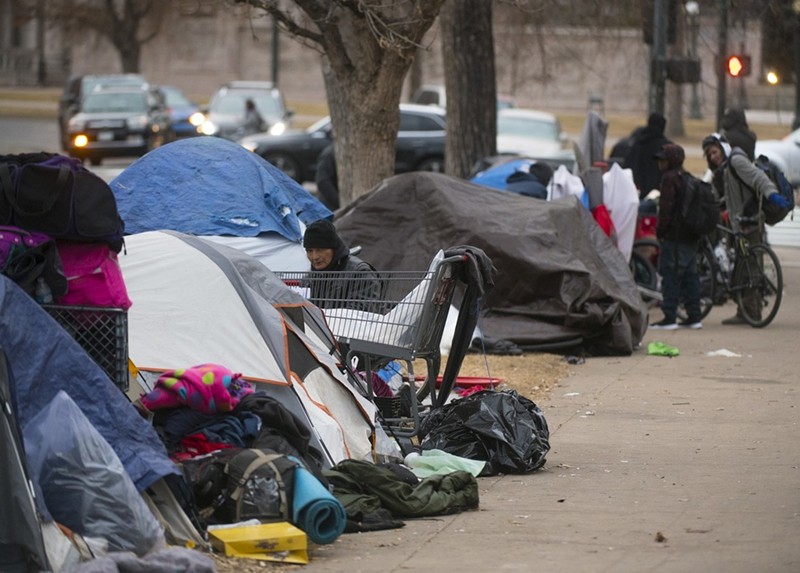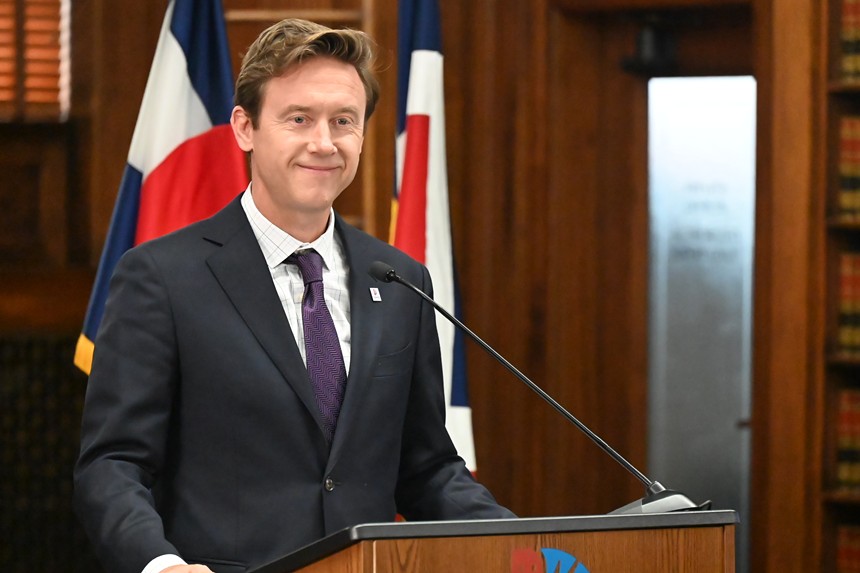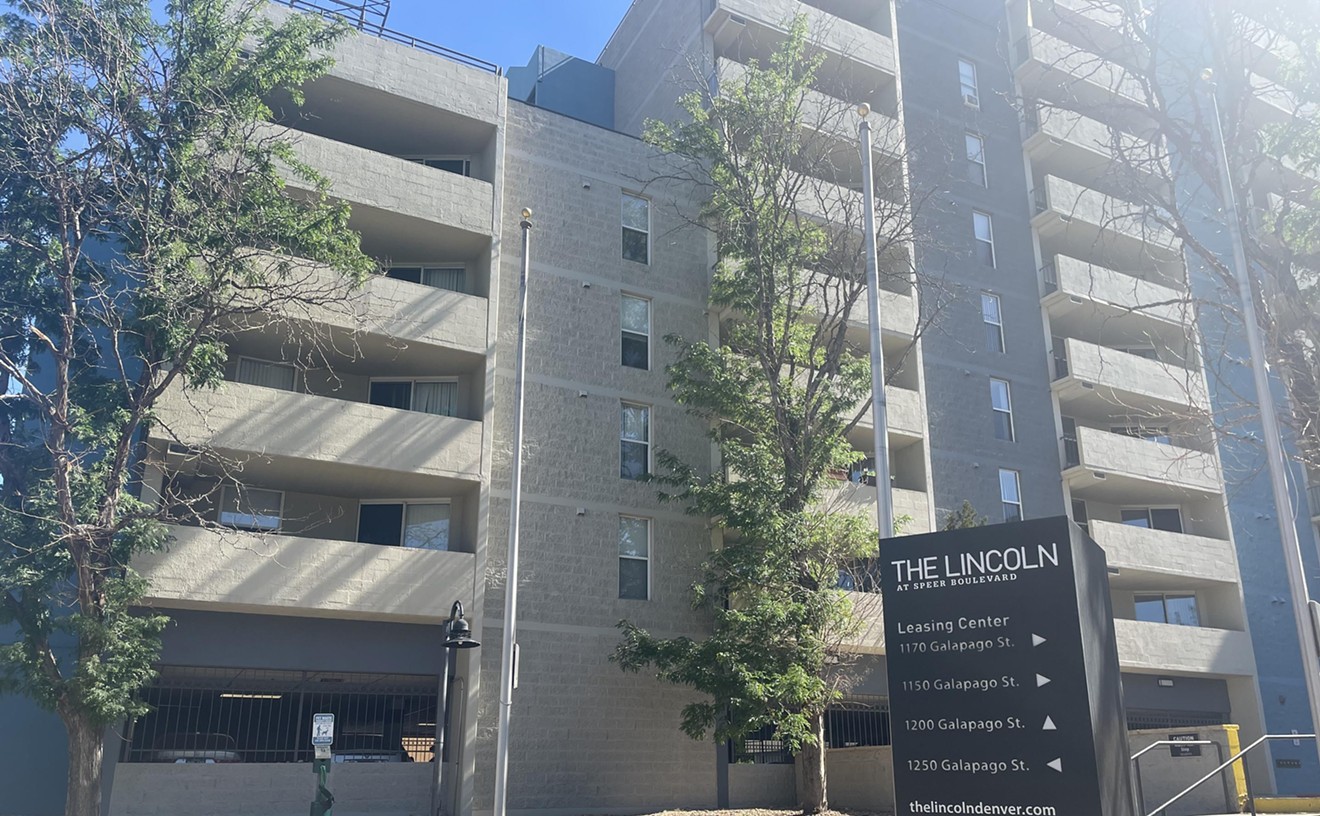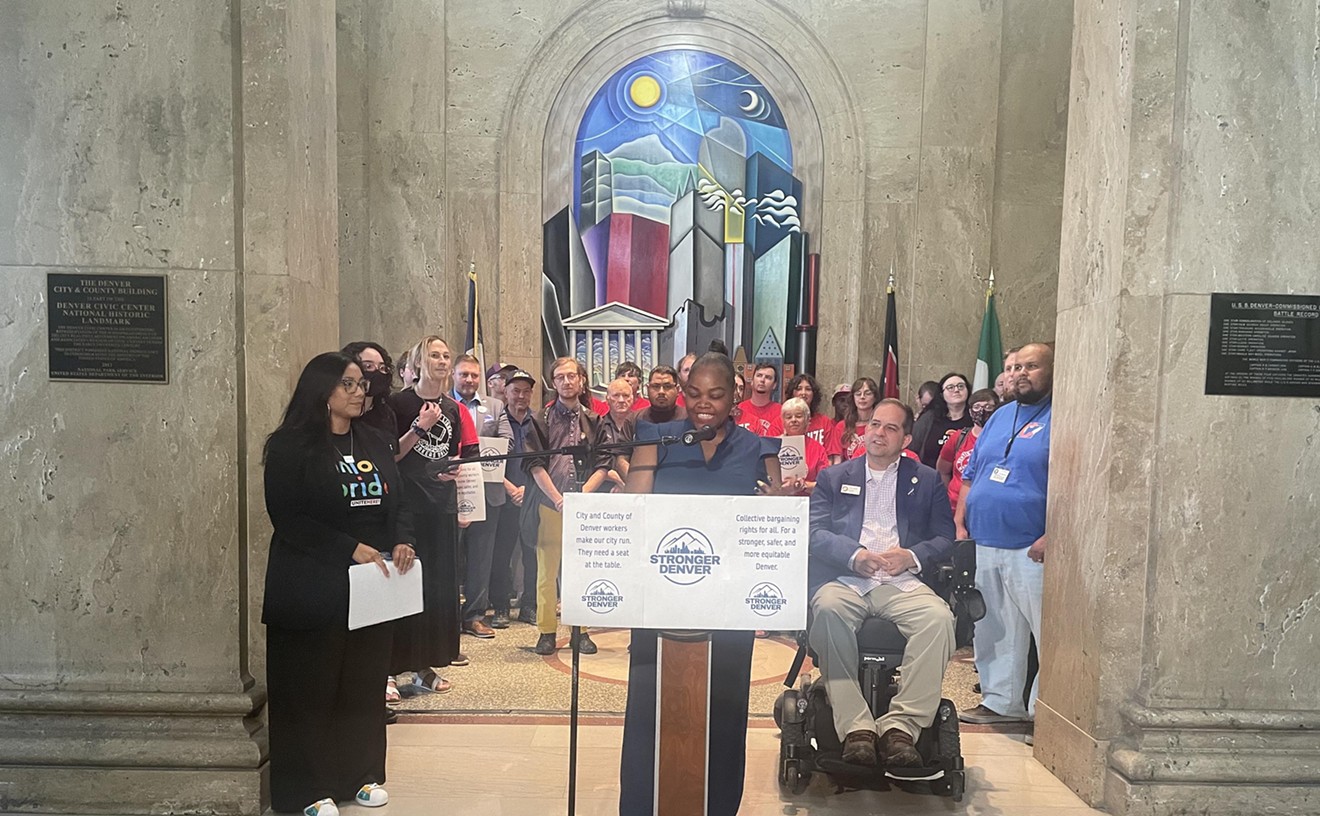For one thing, Johnston's plan is not all contained in the $242 million Department of Housing Stability, or HOST, budget that he has pointed to as his main investment well for getting 1,000 people off the streets and into housing by 2024. During a city budget announcement on September 14, the mayor revealed that his efforts to build affordable housing and solve the homelessness crisis will rely on more than just the HOST budget — both for the coming year and beyond.
Previously, Johnston had promised that Denver's "entire HOST budget" would be "dedicated to the continuum of homelessness and housing." But according to his statements during the announcement, the city will also look to state, local and federal funding for help.
In addition to a $50 million budget for his House1000 plan in 2023, the mayor wants to spend $39 million to house 1,000 homeless people again next year. An estimated $34 million of that would come from the Federal Emergency Management Agency and leftover American Rescue Plan Act funds that must be used by 2024.
Johnston announced his city budget ($4 billion total) with a single message and goal: to create "a Denver that is affordable, safe, sustainable and vibrant for all." It came on the heels of his presentation of the $50 million investment in House1000.
To get to that number, Johnston allocated nearly $37 million in taxpayer dollars via HOST; $10 million from a mix of leftover COVID relief and capital improvement funds; and a few million more as "a bit of cushioning," he said.
While everything is subject to change — the city council begins hearings this week to approve or challenge what's set aside for each department — the mayor expects HOST to have a total bankroll of $242 million. Its official budget hearing is on Wednesday morning, September 20.
According to Johnston, the city hopes to continue providing services and housing for people as long as he's in office.
"We know the work will not be done when this first effort is complete," he said on September 14.
As it's doing this year, the House1000 plan for 2024 will again rely on converted hotels and micro-communities to quickly house the people the city moves from the streets. Johnston expects the number of unsheltered homeless individuals to drop in Denver from 1,423 — the amount of people currently estimated to be living on the streets, per the federally funded annual Point in Time count — to 800.
He hopes to eventually house 2,000 people between now and the end of 2024.
The mayor will also try to prevent homelessness with a number of programs aimed at helping people on the brink of losing their homes, including $13 million for rental assistance and $2 million to offer free legal services for people facing eviction. Both of these programs, specifically, will be funded by the $242 million HOST budget.
The city expects that the number of housed residents who are served by HOST services will level out next year. About 3,000 households are estimated to be receiving help through HOST housing programs and services, and Denver officials want to keep that number at around 3,200 households through 2024.
Under former mayor Michael Hancock, the HOST budget was $302 million for 2023. Mayor Johnston said the city is heading toward a "federal cliff," with money it received in 2021 for COVID relief expiring by the end of 2023.
"We are starting to see the beginnings of some of the federal cliffs people have been warning about," Johnston said last Thursday. "There was a great opportunity there to last several years for historic investments in housing because of those ARPA funds. We're really excited to be maintaining that commitment even despite a significant drop in federal dollars. We're backing that up with a deeper investment in city dollars."
HOST, which was created by Hancock in 2019 through an executive order, spent $148 million in 2022, according to the budget. The department's budget doubled this year, largely with help from the COVID funds, which went toward homeless resolution and affordable housing.
In 2022, $40 million was put toward a Homeless Resolution Fund created by Denver voters in 2020. That money was carried over from 2022 to 2023, but any money left over has yet to be calculated into the new HOST budget."Similarly, the Affordable Housing Property Tax created in 2017 rolled $18 million from 2022 into 2023. These two amounts have expired, leaving the HOST budget $58 million lighter than last year, according to city officials.
However, Denver won't rely too much on HOST to create more affordable-housing units.
According to Johnston, about $100 million in local, state and federal funds has been "set aside" to build another 25,000 permanent affordable-housing units over the next eight years — and to build, convert and preserve 3,000 affordable units in 2024 alone. "More than 50 percent of Denverites could not afford to live in the City and County of Denver," Johnston said. "That means you can't pay the rest of the bills you've got sitting on your kitchen counter."
A note in the city's budget report admits that creating and maintaining these 3,000 affordable units "would likely depend on pursuing additional outside funding sources," because the HOST budget can't cover the "ambitious goal" on its own. Likewise, the mayor wants to speed up the permitting process to okay new housing development projects with a $500,000 investment from the Community Planning and Development budget.
The ultimate goal is to get the city to a three-month turnaround period for affordable-housing development applications.
Most of that — $365,000 — is going toward opening three full-time inspector positions on a dedicated Affordable Housing Review Team "to reduce the time from design to doors-open for these critical projects," according to the budget report.
On top of that half-million investment for permitting reform, Johnston wants to spend $200,000 to gather feedback from the community before implementing reforms.
Investments in the Denver Police Department will also be aimed at helping the city address its issues with the unhoused; out of the $50 million for the 2023 House1000 plan, $750,000 is going toward encampment response, which includes moving people from encampments and into transitional housing.
Roughly $8 million will go toward recruitment of another 167 officers as part of an effort to help the police respond to issues with homelessness, Johnston said. Public Safety takes up the largest share of the general fund compared to any department.
"At the end of the day, all of our challenges need staffing to address those challenges," DPD Chief Ron Thomas tells Westword. "Certainly those additional 167 officers are going to allow us to manage that, which will include the challenges we have with the unhoused."
Many of the new investments in public safety are going toward mental health care and justice reform that can ultimately help prevent homelessness — including $4 million aimed at a 24/7 Behavioral Health Solutions Center for those in crisis and $3 million to add ninety beds to community corrections facilities.
"We're working to rebuild Denver's resources," Johnson concluded. "This lays out our first version of a strategy to deliver that dream of Denver as a city that is vibrant, that is affordable, that is safe, and that provides housing for everyone."













